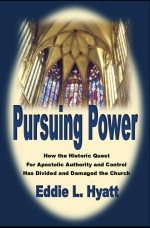Eddie Hyatt: Pursuing Power
 Eddie L. Hyatt, Pursuing Power: How the Historic Quest for Apostolic Authority & Control Has Divided and Damaged the Church (Grapevine, TX: Hyatt Press, 2014), 136 pages, ISBN 9781888435511.
Eddie L. Hyatt, Pursuing Power: How the Historic Quest for Apostolic Authority & Control Has Divided and Damaged the Church (Grapevine, TX: Hyatt Press, 2014), 136 pages, ISBN 9781888435511.
Dr. Eddie Hyatt is known in Pentecostal/Charismatic circles as a man who is passionate about the Word of God, the ministry of the Holy Spirit, and revival. These are major themes in his previous books. In his latest work he addresses what he believes to be a major hindrance to genuine spiritual renewal in the church. This hindrance is the church’s quest for power and control. Hyatt says that his studies have revealed that many, if not most, of the church divisions in history have not been primarily over doctrine but rather over the issue of power—ecclesial power. He substantiates his claim by citing specific examples of this occurring. The picture that emerges is not pretty. As Hyatt says “The pursuit of power has led to the darkest periods of the church’s history, resulting in heresy trials with imprisonments, torture, beheadings and burnings.” The author maintains that this quest for power, which has often been set forth as a means to secure unity, is contrary to the teaching and example of the Lord Jesus Christ. This book is not merely a critique of the past and present errors of the church, it tells us how to move forward into a more biblical and productive future.
A good portion of this book is given to showing that the church’s quest for power has often been rooted in an attempt to be apostolic. Hyatt defines apostolic for us, “‘Apostolic’ was the word used to claim that their faith was the same as that of those first apostles of the Lord, i.e. of the Twelve and Paul. ‘Apostolic’ thus took on the meaning of being ‘connected to’ or being ‘like’ the apostles.” Hyatt demonstrates that throughout history, various groups within the church have claimed to be apostolic in different ways. Some have claimed to be apostolic because their leaders had been taught by the original apostles, others claimed apostolic lineage based on a chain of church leadership that stretched back to the original apostles; still others based their claim on being part of one of the main churches mentioned in the New Testament, such as Jerusalem, Ephesus, or Antioch. Other grounds used to claim that a group was apostolic were a deep spirituality, a return to strong biblical doctrine, a commitment to the missionary mandate of the church, and an alleged return to the New Testament form of church government.
“If there is to be true Christian revival and unity, there must be a letting go of power.”
Category: Ministry, Spring 2014


